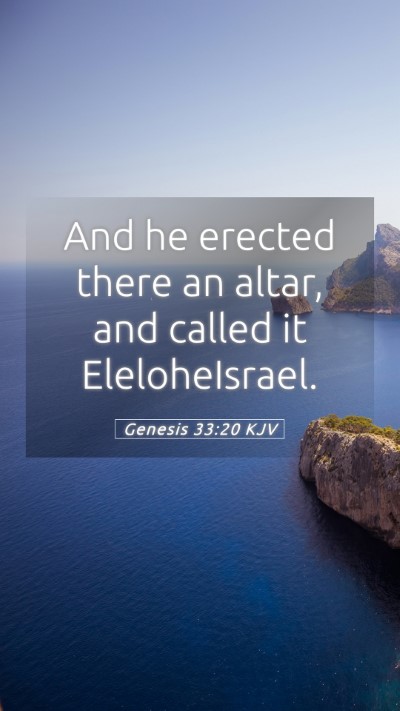Understanding Genesis 33:20 - Bible Verse Meaning and Commentary
Genesis 33:20 states: "And he erected there an altar, and called it Elelohe-Israel." This verse marks a significant moment in the narrative of Jacob's life after his reconciliation with Esau. The insights derived from public domain commentaries provide a profound understanding of its implications and theological significance.
Summary of Key Insights
-
Matthew Henry's Commentary:
Matthew Henry emphasizes the importance of Jacob building an altar as a public declaration of his commitment to worship God. This act symbolizes gratitude and recognition of God's protection and faithfulness, especially after the tensions with his brother. The naming of the altar, "Elelohe-Israel," means "God, the God of Israel," signifying a personal relationship and acknowledgment of God's sovereignty in Jacob's life.
-
Albert Barnes' Notes:
Albert Barnes points out that altars in the Old Testament often served as places of remembrance and thanksgiving. Jacob's act shows his desire to express thanks for his safe return and the restoration of family ties. It highlights the transition from a life marked by struggle and deceit to one of faith and relationship with God.
-
Adam Clarke's Commentary:
Adam Clarke delves into the significance of naming the altar. He notes that "Elelohe-Israel" serves not only as an expression of Jacob's faith but also as a lasting memorial for his descendants. This name indicates a God who is intimately involved in the lives of His people, and it emphasizes the shift in Jacob’s understanding of God after his transformative experiences.
Detailed Reflection on Genesis 33:20
The act of erecting an altar by Jacob serves as a pivotal point in the narrative and in Jacob's spiritual journey. Prior to this moment, Jacob had been characterized by his struggles with identity, family dynamics, and his deceptive past. The construction of the altar represents a newfound commitment to honoring God, reflecting a time of transformation and reconciliation.
The name "Elelohe-Israel," can be interpreted as Jacob publicly declaring the God he serves and establishing his identity as Israel — "he who struggles with God". This moment serves not only as an individual declaration but also as a foundational moment for the nation that would spring from Jacob's lineage, showing how personal faith can have lifelong and generational implications.
It is noteworthy how this passage ties back to the greater themes of redemption, faithfulness, and divine providence throughout the Scriptures. Jacob’s experience of wrestling with God and ultimately finding peace with Esau serves as a microcosm of Israel's journey as a nation.
Application for Modern Readers
For those seeking Bible verse meanings and understanding, Genesis 33:20 challenges us to consider how we acknowledge God in our lives. Building an 'altar' can be seen metaphorically — where do we set aside time or space to recognize God’s presence and faithfulness in our lives?
This verse encourages believers to express gratitude and establish a relationship grounded in faith. It invites reflection on the moments in life where reconciliation is needed, encouraging acts of worship and acknowledgment of God’s work in our hearts.
Cross References
-
Genesis 28:18-22: Jacob's earlier experience with God at Bethel establishes his journey towards faith, leading up to this moment.
-
Genesis 32:28: Here, Jacob receives the name Israel after wrestling with God, setting the stage for his relationship with God and identity.
-
Exodus 20:24: Instructions for building altars in worship highlight the importance of such acts in the life of God's people.
-
Hebrews 11:21: This verse references Jacob's faith as a part of the greater narrative of the patriarchs.
Conclusion
Genesis 33:20 encapsulates critical aspects of Jacob's transformation and commitment to God, demonstrating the significance of worship in expressing gratitude and establishing a legacy of faith. Through the perspectives of various commentaries, we gain a fuller understanding of not just the passage itself, but its implications for both historical and contemporary readers striving to integrate scripture into their daily lives.


